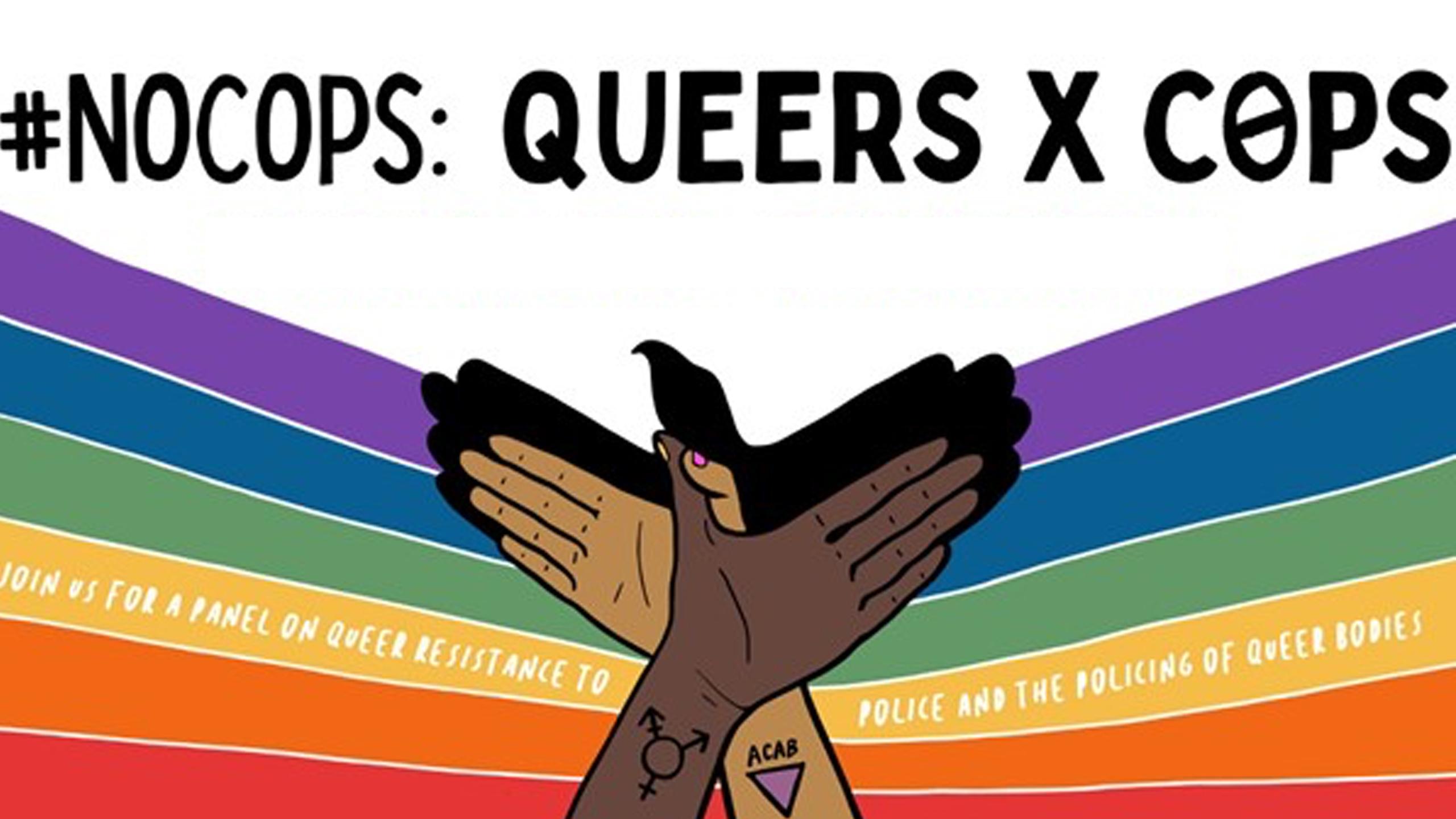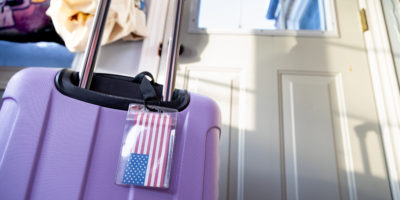By Prapti Bamaniya
Abolition of the police is needed to mend interactions between emergency services and queer students, said queer academics during the Queers X Cops panel on Feb. 25, hosted by the Ryerson chapter of Canadian Students for Sensible Drug Policy (CSSDP).
Queer academics Syrus Marcus Ware, Ravyn Wngz, Gary Kinsman and Megan Scribe suggested students become more attuned to the perspectives of LGBTQ2IA+ folks and the systemic barriers they face by reading the works of “trusted authors” such as Lindsay Nixon, Dr. Alex Wilson, Octavia Butler and Adrian Marie Brown.”
Along with reading, people learn more from organizing and from activism, said Kinsman, a panelist and leading academic on LGBTQ2IA+ issues. “That type of learning actually has an embodied and different feeling to it…getting involved and engaged in communities and movements, whether they’re on campus or not,” he said.
Ware said the work needed to solve these issues is happening right now, but he also says it’s not enough.
Ware is an activist and assistant professor in the School of the Arts at McMaster University. “I will never forget the ways that campus police on university campuses have become these militarized, weaponized, violence horses that are in some ways, doing more harm than good,” he said at the panel. The panel agreed that removing campus security was the first step towards police abolition.
Ware referred to International Women’s Day 2005 as an example of violence from campus security. Ryerson security collaborated with Toronto police in the arrest of queer activist Wendy Maxwell, who was living in Toronto illegally. She was deported to Costa Rica the following week.
“That shouldn’t have gone down the way that it did,” said Ware. “This is what we’re seeing with campus [security] all over. They’re just ramping up and mushrooming and becoming the military elite forces to university students and it just makes no sense.”
Special constables (security personnel with policing authority in certain incidents such as assault, theft and bylaw enforcement) have been permitted on nine university campuses across Ontario, including the University of Toronto and Wilfrid Laurier University. The latter is currently under external review for their interactions with Black, Indigenous and racialized community members, according to CTV News.
A campus security guard at Trinity Western University in Langley, BC was recently charged with manslaughter following an altercation on campus.
Ryerson halted their plans to move forward with a special constable program in June, two weeks after it had been approved by Toronto Police Service, as previously reported by The Eyeopener.
The decision came after many Ryerson community members organized against heightened campus policing. That same day, the Black Liberation Collective at Ryerson, who have been organizing against police presence on campus since 2018, released an open letter addressed to Ryerson president Mohamed Lachemi and executive director, community safety Denise Campbell.
“End the agreement with Toronto Police Services immediately, and make an open commitment to never partnering again,” read the letter. “Make the terms of the agreement public, as well as the individual involved in brokering the deal.”
Ryerson’s CSSDP chapter also mobilized by launching their No Cops on Campus campaign against the presence of special constables on campus on May 14. The group also demanded the hiring of more social workers to collaborate with Ryerson campus security.
“While some feel more secure with increased presence of uniformed personnel, others feel unsafe and racialized community members in particular feel the impact of racial profiling by the police,” said Ryerson president Mohamed Lachemi in his announcement of the Presidential External Expert Panel on Campus Safety in August.
Other police interactions with the queer community close to Ryerson Campus include the 1981 Toronto Bathhouse Raids, when Toronto Police carried out violent raids against four bathhouses prominent to the gay community and arrested 286 men.
“The [police] destroyed the places where we gathered, and where we found community, intentionally. And we know that this continued police violence and intervention in queer spaces continues to this day,” said Ware.
Abolition goes further than police
The panellists discussed how abolition extends beyond police into all institutions that involve policing and criminalizing marginalized people.
“We want to abolish the police, but we also really want to abolish the policing operations of various other social institutions,” said Kinsman. “If we get that police defunded partially, those funds actually go to other institutions that will continue to carry out policing type of work, whether it’s through social work, whether it’s to psychiatric practices, whether it’s through various other institutions.”
Scribe echoed concerns with institutions outside policing, noting that institutions from social works to hospital staff to emergency responders work together “at the frontline of enforcing Canada’s settler colonial agenda.”
Scribe gave the example of hospital staff who alert social workers to attend to expectant Indigenous parents deemed “high risk,” which can lead to the parents losing their children. Enforcement of different policies and protocols is carried out by police, Scribe added. “[These institutions] are in each other’s speed dial.”
Social work has and continues to play a major role in Canada’s colonial project. Following residential schools, the Sixties Scoop—the forced removal of Indigenous children from their communities and placement into non-Indigenous homes—became the main tool of assimilation and cultural genocide against Indigenous peoples.
A 2018 report from the Ontario Human Rights Commission found that Indigenous children represent approximately 30% of foster children, despite making up only 4.1% of the population in Ontario under age 15. Indigenous children are “over-represented at all points of child welfare decision-making,” the report reads.
The negative impacts of being taken into care include long-term unresolved trauma, permanent mistrust of institutions and deep feelings of cultural disconnection and loss of identity because of a lack of Indigenous cultural education (given most children are placed into non-Indigenous homes).
The report also found that Black children in Ontario are over-represented in the child welfare system.
Panellists call for shift in understandings of mental illness
Police don’t need to treat people with mental illness as a danger to the public, said Ware. People with mental illness are more likely to be victims of violence, not perpetrators, according to a report from Global News.
“We need to shift and change our understanding of wellness and mental health, and dealing with people in the way that they function as opposed to telling them that they’re wrong,” said Ravyn Wingz, a panelist and co-founder of Black Lives Matter Canada.
Ware said he thinks those going through a mental crisis, especially queer or BIPOC folks, receive different treatment from police. “One cannot be mad in a public space without potentially having your life taken…we must not forget when the police arrive in the case of the so-called wellness checks. You know it’s often within a matter of seconds that they’ve charged their weapon.”
Although there are different opinions on solutions, there is a clear problem affecting every marginalized community, according to Ware.
“Mad people, Black people, trans people, people of colour and Indigenous people are victims of the police service, and that is something that needs to change right now,” said Ware. “The best way to start is in your own community.”
With files from Maneula Vega
CORRECTION: The headline and article have been updated to reflect that the academics and CSSDP believe in police abolition, not reform. This article has also been updated to credit the Black Liberation Collective at Ryerson for mobilizing against police presence on campus. A previous version of this article misquoted Megan Scribe and has been updated to accurately reflect the panel’s stance on social workers. The Eyeopener regrets these errors.













Tyra Kanter
what is Ryerson’s current campus security policy? i’ve been looking everywhere but I am unable to find it. are there special constables currently employed?
Nick
“Abolition of the police is needed to mend interactions between emergency services and queer students, said queer academics during the Queers X Cops panel on Feb. 25, hosted by the Ryerson chapter of Canadian Students for Sensible Drug Policy (CSSDP).”
You can’t mend interactions between emergency services and students by getting rid of police, emergency service workers will NOT enter an area with out police escort because it puts their lives in danger, that’s why there are so many preventable deaths in autonomous zones.
You need to rethink that one.